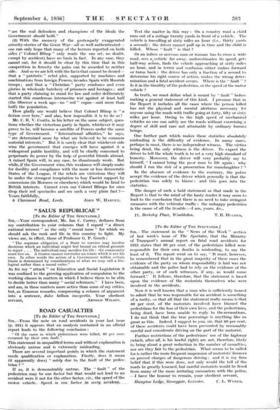[To the Editor of TILE SPECTATOR.] SIR,—The statement in the
" News of the Week " section of last week's issue of The Spectator, that the Ministry of Transport's annual report on fatal road accidents for 1935 states that 80 per cent. of the pedestrians killed were responsible for their own deaths is misleading, to say the least of it. The report went on to say, " It must, however, be remembered that in the great majority of these cases the evidence of the party on whom responsibility is laid was not obtainable and the police had to rely on the evidence of the other party, or of such witnesses, if any, as would come forward:: It follows, therefore, that the statement is based upon the evidence of the motorists themselves who were involved in the accidents.
Now it is well known that a man who is sufficiently honest to admit that he was responsible for an accident is something of a rarity, so that all that the statement really means is that 80 per cent. of the motorists involved have blamed the pedestrians for the loss of their own lives, and the pedestrians, being dead, have been unable to reply to the accusations. I do not think that the true percentage is anything like as great as this. Indeed, I suggest to you, sir, that 80 per cent. of these accidents could have been prevented by reasonably careful and considerate driving on the part of the motorist.
Further restrictions of the pedestrians' use of the highway (which, after all, is his lawful right) are not, therefore, likely to bring about a great reduction in the number of casualties, nor are they fair to the pedestrian. What seems to be called for is rather the more frequent suspension of motorists' licences on proved charges of dangerous driving ; and it is my firm belief that if this were done, not only would the toll of the roads be greatly lessened, but careful motorists would be freed from many Of the more irritating encounters with the police. —I have the honour to remain, your obedient servant, Hampton Li,dge,"Stoneogate, Leicester. C. L. WYKES.






































 Previous page
Previous page